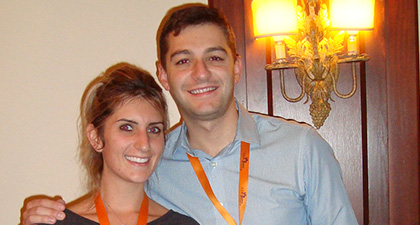Jews from the former Soviet Union are different from the “mainstream” Jewish community in Canada. That was the sentiment expressed repeatedly this past weekend, including from those who weren’t themselves born in the FSU but still identify as “Russian Jews.”
Some 400 self-identified FSU Jews, predominantly Toronto-based, gathered at the Canadiana-adorned Deerhurst Resort several hours north of the city for Canada’s inaugural Limmud FSU conference.
The volunteer-driven conference was designed to awaken enthusiasm for Jewish life and learning among young Russian-speaking adults, both currently living in and originally from the FSU. The target demographic was 20 to 40, but people across the age spectrum attended.
Limmud FSU was founded in 2006 and has since been held annually in places such as Russia, Ukraine, Israel and the United States. The weekend consisted of speaker sessions, hands-on workshops, Shabbat rituals and meals, fitness classes and musical performances. Speakers addressed a range of subjects, from geopolitics and the Holocaust to literature, entrepreneurship and sexuality.
Highlights included “Global Anti-Semitism and International Terrorism,” presented by Liberal MP and former justice minister Irwin Cotler; “Do they have Power? The Russian-speaking Jewish Elite in Russia,” presented by Olena Bagno, a researcher at the Institute for National Security Studies in Israel and a post-doctoral student at the University of Toronto’s Centre for Jewish Studies; and “Kosher Lust: Love is Not the Answer,” presented by U.S. author and TV host Rabbi Shmuley Boteach.
Numerous participants amassed in the halls between talks, speaking an animated jumble of Russian, Hebrew and English about why they had come to the conference, the value they saw in gathering as a distinct group, and their overall sense of identity and difference.
Though their opinions varied somewhat, a common thread was a feeling of cultural separateness from the rest of the Toronto Jewish community, as well as a deep sense of pride in their heritage and a desire to preserve their language and traditions.
Alex Zveiris, 29, and his wife, Rachel, 26, were volunteer members of the conference’s organizing committee and attended the event with their eight-month-old baby.
“We want to emphasize the Jewish and the Russian parts of our identities. Both of our parents are from Russia,” said Zveiris, who was born in Ukraine and lived in Israel from age five to 19. “UJA [the United Jewish Appeal] has a lot of programs catered to the overall Jewish community in Toronto, which is great, but Russian Jews are, for some things, culturally different… I know when my son grows up I want him to speak Russian, to know about his background and not to lose his identity.”
When asked if he could pinpoint the difference between FSU- and Canadian-born Jews, he said: “For Canadian Jews, everything is set for them already. Me being an immigrant, things have been more difficult, so I appreciate things more… also, we have a very family-based culture and are not planning every little thing so much. We’re just living day-by-day… we’re more spontaneous, adventurous.”
Ilya, 27, who chose to withhold his last name, was born in Russia and moved with his family to Montreal in 1989. Several years ago, he moved to Toronto on his own. He said Limmud appealed to him because of the collection of speakers, but also because it was “a good opportunity to meet fellow Russian Jews who live in Toronto.”
He attributed many of the cultural divisions between FSU Jews and the rest of Toronto’s Jewish community to the struggles faced by adult immigrants in the major immigration waves of the ’80s and ’90s, though he believes integration is increasing with younger generations.
“Those who came [as adults] had to retrain professionally, seek equivalencies and integrate into the market, versus the Jewish community that had been in [Canada] for much longer and already had all sorts of professions,” he said. “There are very few doctors, lawyers or other highly-regulated professionals among the adult FSU immigrants who came, but now their children are doing that, creating fewer differences.”
While FSU Jews are known for being largely non-religious, Irina Petrini, who left Russia in 1975 and now lives in Toronto, said she is a “so-called ba’al tshuvah… unfortunately, a minority in the Russian-speaking Jewish community.” “I think the idea of Limmud is good,” she said, “but I would like to have seen a bit more Jewish content – by that, I mean Torah content.”
The question of difference was addressed at a panel discussion titled “What Makes Russian Jews Jewish,” featuring Anna Shternshis, a professor at U of T’s Centre for Jewish Studies, Yigal Kotler, a doctoral candidate at the Jewish Theological Seminary and Olga Levitski, a PhD candidate in sociolinguistics at the University of Ottawa. They discussed factors such as shared memory, a community bolstered not by religious observance but resistance to fascism, and a lack of acceptance of Russian Jews by “mainstream Jews” in Canada.
But they also noted that, as the Pew Research Center’s recent “Portrait of Jewish Americans” shows, secularization and intermarriage among North American Jewry is rising steeply and that FSU Jews are actually more likely not to intermarry and to feel more connected to Israel.
